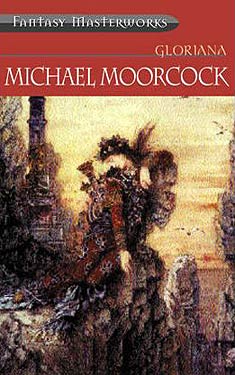Michael Moorcock
Completed 11/23/2023, Reviewed 11/23/2023
3 stars
This was an extremely well-written novel with terrible content. It’s a parody of The Fairie Queen as well as an homage to another author. It’s an alternative universe Great Britain and Elizabeth I, here named Albion and Gloriana, respectively. It’s full of court intrigue and sex. Somehow, the sex is done matter of fact and not pornographically. The original ending was a terrible message and Moorcock was reprimanded about it, so he rewrote the ending. It’s still not great, but at least a little more palatable. This book won the 1979 World Fantasy and Campbell Awards, thus concluding my personal challenge of reading all the Mythopoeic and World Fantasy Award winners through last year. I have yet to read this year’s winners, but they were outside the scope of my challenge.
Gloriana has ruled over a Golden Age of Albion for thirteen years since the death of her despot of her father, the King. Her only problem is that she can’t achieve orgasm. Thus, she is unmarried, determined not to marry until she can be sexually fulfilled. In the meantime, her Chancellor, Montfallcon, uses spies, kidnappings, and assassinations to preserve Gloriana’s throne. This leads to some complex and underhanded court politics, namely, the employ of Quire, an extremely successful rogue, by Montfallcon. After an argument, Quire leaves Montfallcon to work for another kingdom to help bring down Albion and Gloriana. Suddenly, there are unsolved murders in the Court, destroying the peace within and without, leaving Albion on the brink of war with the Tatars and revolution from within its own borders.
The best thing about this book is the writing. It is an homage to older literary works, with long paragraphs of prose and soliloquies. The characters are very verbose, particularly Montfallcon and Quire. I have to admit that while I can say it was beautifully written, sometimes I got a little bored with the length of some of the passages. However, I mostly found it engrossing to read complex word choices and sentence structures. I don’t know if I can say if the world building was imaginative since I haven’t read The Fairie Queen or any of Mervyn Peake’s works (to whom Moorcock dedicated the book). But in and of itself, it is well crafted.
I also have to say that the characterization was phenomenal. I had a good sense of who many of the characters were and what drove them. There were some lesser nobles who blended into one another, but the main characters were extremely well drawn. Montfallcon’s fall from grace is terrific as is Quire’s dastardly betrayal. Gloriana herself was rather simple, but Una, her personal secretary, was a terrific, strong female character.
The whole orgasm plot was pretty weird. There wasn’t much sex, just a lot of allusions to it, very matter of fact. As I said above, there was nothing pornographic about it. However, Moorcock leads you down that path and your mind fills in the details.
WARNING: SPOILERS FOLLOW!!
Along this plotline, the ending was pretty weird. Gloriana finally achieves orgasm by overpowering her would be rapist by asserting herself as authentic self, not as Albion incarnate, as well as with the help of a knife to his crotch. This is the revised ending. Originally, she achieved orgasm during the rape, as in being completely out of control. Fortunately, this ending was quashed by heavy criticism, particularly from Andrea Dworkin, the anti-pornography feminist and friend of Moorcock’s. If this was written today, maybe Dworkin would have been a sensitivity editor and would have caught this before it was published. But in 1978, I can see how the original ending would have gotten through the male-dominated publishing industry.
Besides this major problem with ending, I also didn’t like how everything came together so neatly. After writing such a complex novel, one would think Moorcock would have had a much more complex ending as well.
I give this book three stars out of five. Great writing, lousy sexual plotline, much too-tidy ending. I’ve only read two other books by Moorcock, Behold the Man, a terrific parody of religion, and The Final Programme, a decent parody of spy novels. In the next year, I plan to read the Elric Saga, one of his most famous works. I hope that is equally well written with hopefully a less problematic plotline.

No comments:
Post a Comment